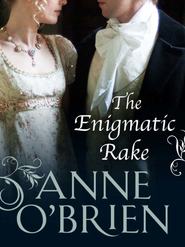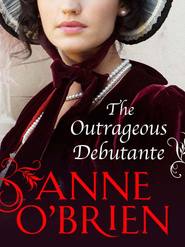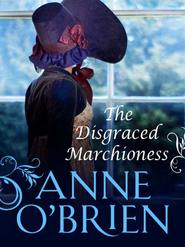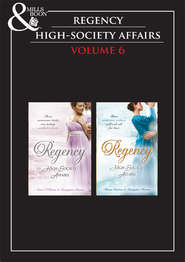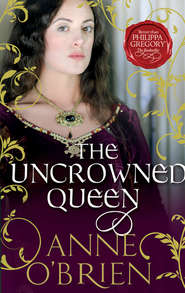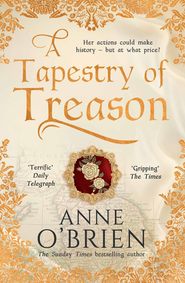По всем вопросам обращайтесь на: info@litportal.ru
(©) 2003-2025.
✖
Marriage Under Siege
Настройки чтения
Размер шрифта
Высота строк
Поля
‘It is not important …’
‘I suppose that means no. No wonder you look so pale and tired.’ Mansell took her arm, in a gentle grasp, but one which brooked no more argument and allowed her no room for rebellion. He led her to the stair. The wolfhound shook herself and pattered after them, her blunt claws clicking on the stone treads.
Soon Lady Mansell found herself ensconced in a cushioned settle before the smouldering, banked fire in the solar.
‘Stay there,’ he ordered, frowning down at her. ‘I shall return shortly.’
It was easiest, Honoria decided, to do just that, although she did not want the inevitable conversation with the new owner of Brampton Percy. He returned with wine and a platter of bread and cheese, which he placed at her elbow and then kicked the logs into a blaze. When he took a seat on the settle facing her, Morrighan stretched before the warmth with a heavy sigh, but kept her pale eyes on the intruder. Honoria sat quietly, waiting, ignoring the food and wine.
‘I cannot force you to eat, of course,’ he commented in a clipped tone, disapproval evident in his stern face.
‘I am not hungry.’ The slightest of shrugs.
Suppressing the urge to take issue with her on this point, he decided that it would serve no purpose and that he should go with impulse to discover what he could about the lady. ‘Will you tell me about your marriage?’ he asked abruptly. ‘I will understand if you choose not to but … Do I presume correctly that it was not a love match.’
‘No. It was not.’
‘I see.’ What should he say next?
‘You should not forget, my lord, that I was an heiress,’ the lady obliged him by explaining the situation, ‘and my parents were dead. The Court of Wards placed me and my estates under the authority of Sir Robert Denham as my guardian, until such time as a suitable marriage could be arranged.’
‘Of course. And so Lord Edward bought your wardship from Sir Robert.’
‘Indeed, my lord. Lord Edward informed me that he had managed to scrape together enough money from the estate for the purchase in the hope of a good return on his investments. Not least an heir. It cost him the noble sum of £2,000 to acquire my hand and my lands. He begrudged every penny of it and the effort it took to raise it from his unwilling tenants. He lost no opportunity to inform me of it.’
The statement of events was delivered in such a soft, flat tone, but his ear was quick to pick up an underlying thread of—what? Hurt? Humiliation? His heart was again touched, the merest brush of compassion, by her calm acceptance of her experiences.
‘That could not have been pleasant for you.’
‘It is the lot of heiresses, I believe. I cannot complain.’
‘Forgive me for touching on a personal subject, but surely your guardian could have found you a more suitable husband?’ Mansell resorted to the direct. ‘Lord Edward must have been nearer sixty than twenty. And, with respect, I would have expected you to have been married before now.’
‘Before my advanced age?’ Her hazel eyes met and held his. ‘I am twenty-three, my lord.’
A slight flush touched his lean cheeks and a spark of anger, of guilt, glinted in his eye: he might have broached the subject head on, but he had not expected her to be so outspoken. ‘It was not my intention to be so insensitive, my lady. It is simply that, in general, heiresses have no lack of suitors. There must have been others more … appealing, shall we say, than my cousin Edward.’
‘You read the situation correctly, my lord. I am not offended. There was no lack of suitors.’ She was cold now, as if reciting the contents of a recipe. ‘When I was very young I was betrothed to George Manners, the heir to the Stafford estates. I only met him once. He was very young—still a child, in fact, even younger than I was—and very sweet. I remember that he wanted to climb the trees in the park … he died from a contagious fever within a year of our betrothal.’
‘I am sorry.’
She lifted her shoulders again dispassionately, turning her face to the fire. ‘And then I was betrothed to Sir Henry Blackmore, cousin to the Earl of Sunderland. He had very powerful connections and had his eye to my estates. We met on a number of occasions. We would seem to have been compatible. He died from a bullet in the head last year at Edgehill.’
‘I see. And then there was Edward.’
‘And then there was Edward.’ A mere whisper.
He could think of nothing to say about the sad little catalogue of events.
‘So you see,’ she continued, her voice stronger now, ‘as long as Lord Edward was willing to pay the price, my guardian was more than pleased to accept his offer.’
‘Were they kind to you?’
‘Sir Robert? Of course. I was given every attention and consideration by Sir Robert and his wife. It was his duty to do so and he took his obligations very seriously. As a Baron of the Exchequer, he could afford to live in considerable style and I was brought up with his daughters as one of the family. I lacked for nothing. My education was exemplary. I have all the skills deemed necessary for an eligible bride. But a guardianship cannot go on for ever. I believe that the outbreak of the war spurred my guardian to push for the marriage. And I believe that he wanted the money to donate to the Royal cause.’
But they did not care for you, did not love you, did they? Did she realise that she had spoken only of duty and obligation?
Mansell felt a sudden inclination to ask if Lord Edward had also been kind and considerate to her but knew that he must not. It was too private a matter. And after Croft’s comments, the answer was in doubt. Whatever the truth of the matter, she was now free of her obligation and might achieve a happier future.
‘What will you do now, my lady? I presume that you will not wish to return to the household of your guardian.’
‘No. I have no further claim on them. The legal obligation is complete. But I have made plans. You need not fear that I shall be a burden on you, my lord. As an heiress I have an excellent jointure. It will all be clarified at the reading of the will, but I am aware of the terms of the settlement that was negotiated with Sir Robert on my marriage. I know that Lord Edward made a new will on our return here and my jointure is secure. I need nothing from you.’
‘That was not what I meant.’ He tried to quell the sudden leap of annoyance at her resistance. ‘Where will you go?’ he pursued. ‘You can hardly live alone and unprotected. Not with the prospect of armed gangs, not to mention legitimate troops who are prepared to take possession of any property that might further their cause.’
‘I shall not be unprotected.’ She noted but ignored the impatience in his voice and in the determined clenching of his jaw. ‘Sir William Croft offered me an armed guard if I wish to travel any distance. And certainly I can live alone within my own household. As a widow of advanced years I hardly need a chaperon. And as a woman I believe that I will be in less danger of attack than you, my lord. No man willingly wages war against an unprotected woman. It is not considered chivalrous.’ Her lips twitched in the merest of smiles. ‘Sir William’s warning and advice to you would seem to have been most apt, my lord. It is perhaps necessary for you to look to your own possessions, rather than be concerned with mine.’
‘I see that you are well informed!’ And how did she know about that? Annoyance deepened. ‘I suppose that I must learn that nothing remains secret for long in this house.’
‘Very true. Besides,’ she continued, ‘I have had my fill of protection, of betrothals and marriage.’ She breathed in steadily as her wayward emotions once more threatened to slip beyond her grasp. ‘Primarily I shall go to Leintwardine Manor. It is part of my jointure and only a short distance from here. I shall be comfortable there. It is a place of … great charm.’
‘I still do not think you should do anything precipitate,’ Mansell insisted. ‘Take time to decide what is best for you.’
‘I shall remove myself from this place as soon as may be. By Friday, if that can be arranged.’ He noted the faintest of shudders once again run through her slight frame and did not believe that it was from cold.
‘You sound as if you hate it here.’
‘I never said that.’ For one moment her eyes blazed, glinting gold and green in their depths, only to be veiled by a swift downsweep of sable lashes.
‘You do not appear to appreciate the very real dangers,’ he pursued the point, but knew he was losing the battle. ‘I feel a sense of duty to see to your comfort—and safety.’
‘How so?’ Her gaze was direct, an unmistakable challenge. ‘You have no duty towards me. You need not concern yourself over my future, my lord Mansell. After all, until yesterday, you were not even aware that I existed as a member of your extended family. After tomorrow, I shall take my leave.’
Abruptly she stood to put an end to the discussion and walked from the room without a backward glance, leaving food and wine untouched, her black silk skirts brushing softly against the oak floor. The wolfhound shadowed her once more, leaving Mansell alone in the solar to curse women who were obstinately blind to where their best interests might lie.
‘And the problem is,’ he confided to Sir Joshua when he walked with him to the stables an hour later, ‘I find that however much I might wish to accept her decision, to let her make her own arrangements, I simply cannot do so. God save me from difficult, opinionated women!’
Chapter Three
‘A sad occasion, my lord.’ Mr Gregory Wellings shuffled the papers before him with all the professional and pompous efficiency of a successful lawyer.
Thursday morning.
They had chosen to meet in a room that might have been transformed into a library or study, or even an estate office, if any of the previous Brampton lords had shown the least inclination towards either books or business. Since they had not, it was a little-used chamber, of more recent construction than the original fortress, but neglected in spite of the splendid carving on the wooden panelling and the wide window seats, which might tempt someone at leisure to sit and take in the sweep of the distant hills. Although it was rarely used, there was clear evidence of some recent attempt at cleaning, presumably for this very event. Where else would it be possible to invite Lord Edward’s legal man to read the will to those who might expect some recognition? The floors had been swept, the heavy hangings beaten to remove the worst of the dust and cobwebs. A fire burned and crackled fiercely to offset the dank air. The mullioned windows, larger than many in the castle, had been cleaned and, although still smeared with engrained grime, allowed faint rays of spring sunshine to percolate the gloom. A scarred, well-used oak table served as a desk for Mr Wellings to preside over the legal affairs of the dead, the surface littered with documents and letters, frayed ribbon and cracked seals. The two documents before him, upon which his thin hands now rested, were both new, the paper still in uncreased and unstained condition.
Honoria had taken a seat on an upright chair beside the fire. Lord Mansell stood behind her, leaning an arm against the high carved mantel. The lady was as impassive as ever, but Mansell’s concern for her well-being increased as the days passed. If she had slept at all the previous night it would have been a surprise to him. Her hair and skin and her eyes were dull as if they had lost all vitality and he knew with certainty that she was not eating enough. If only she had some colour in her cheeks and not the stark shadows from exhaustion and strain. Whatever was troubling her was putting her under severe stress, but she clearly had no intention of unburdening her anxieties to him. Whenever possible she absented herself from his company. When they met they exchanged words about nothing but the merest commonplace. Why are you so unhappy? he asked her silently, glancing down at her averted face. Surely your freedom from Sir Edward with a substantial income in your own name should be a source of happiness and contentment, not despair? But he found no answer to his concerns. Perhaps she was indeed merely dull, with no qualities to attract.
But, he decided, quite unequivocally, she should not wear black.






